| |||||
| |||||
|
||||||||||||||||||||||||||||||||||||||||||||||||||||||
| XBackground for the Music VideoX | ||
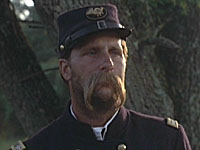 |
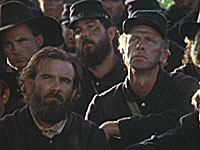 |
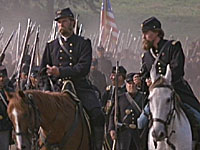 |
|
Colonel of the 2nd Maine, Chamberlain was handed a batch of "deserters", men from a disbanded Maine regiment who hadn't realized they'd signed longer papers than their friends. Threatened with execution before they reached him, Chamberlain talks to their representative, Private Bucklin, then to the men, about his reasons for being in the war. "I'm tired, Colonel. I've had all of this army and all of these officers, this damned Hooker, this damned idiot Meade, all of them, the whole bloody lousy rotten mess of sick-brained, pot-bellied scabheads that ain't fit to lead a johnny detail, ain't fit to pour pee out of a boot with instructions on the heel." Chamberlain explains the reason he needs their help for this battle. "This is a different kind of army. If you look at history you'll see men fight for pay, or women, or some other kind of loot. They fight for land, or because a king makes them, or just because they like killing. But we're here for something new. This hasn't happened much in the history of the world. We are an army out to set other men free. America should be free ground, from here to the Pacific Ocean. No man has to bow, no man born to royalty. Here we judge you by what you do, not by who your father was. Here you can be something. Here you can build a home. But it's not the land. There's always more land. It's the idea that we all have value, you and me. What we're fighting for, in the end, is each other. Sorry. Didn't mean to preach." He is able to convince all but three to join his unit. They march for Gettysburg.
|
||
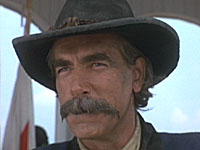 |
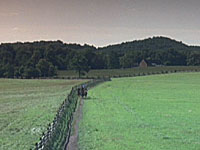 |
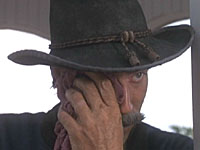 |
|
B: They've got a brigade in position, and that's all. I have the best damn ground around and they're hitting me with one brigade. Lovely. Lovely. General Buford is the first in Gettysburg and recognizes the high ground is available, and the Confederates will reach it before Reynolds arrives with his men. If the Confederates take the high ground, the Union soldiers will be slaughtered. Buford has a troop of dismounted cavalry and some artillery but, as he looks at the lovely ground, he remembers when he and his men waited and help never came. He writes to ask Reynolds what he should do, and Reynold says hold the ground. Buford does, but the battle is going against him until when he thinks it's hopeless, Reynolds arrives in advance of his marching columns. Buford's men are saved. B: Thank God.
|
||
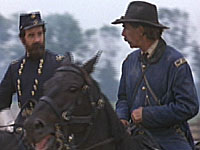 |
 |
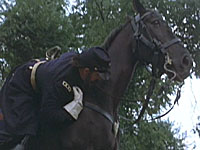 |
|
R: Heth probably has about 10,000 men coming down that road, wouldn't you say? General Reynolds is positioning his men when he is killed with a head shot from a Confederate sniper. This is a terrible blow to Meade's army. R: Forward! For God's sake, forward.
|
||
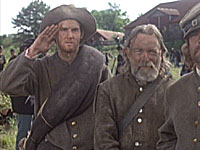 |
 |
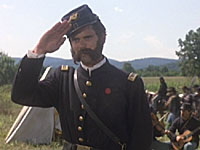 |
|
Reading Chamberlain, you see a tremendous respect of the fighting men on each side for those fighting on the other. Tom Chamberlain talks to some Confederate prisoners of war who are just glad that, for them, the war is over. They've seen too much already. With great respect, the Confederate salutes Tom, "See you in Hell, Billy Yank." Tom salutes them back, "See you in Hell, Johnny Reb."
|
||
 |
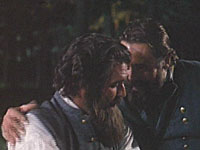 |
 |
|
L: I guess my only cause is victory. This war comes as a nightmare. You pick your nightmare side. Then you put your head down and win. General Longstreet is the favorite of General Lee, who keeps him near. One of the units under General Longstreet is General Picketts, and one of General Picketts' officers is General Armistead. These men know each other from the Mexican campaigns, and are old friends and drinking buddies and gambling buddies.
|
||
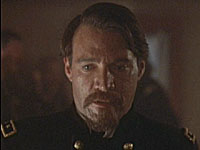 |
 |
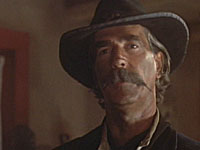 |
|
General Buford has come to report to General Hancock that General Reynolds is dead. Hancock asks if this is good ground on which to fight. Buford says it's very good ground. Then Buford tells Hancock that Hancock's dearest friend, the man he loves as a brother, General Armistead, is on the opposite heights.
H: I wonder how old Lo is doing. If he's still alive.
|
||
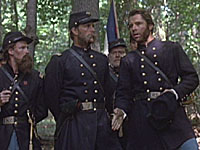 |
 |
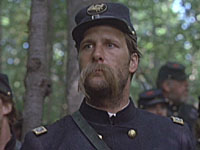 |
|
V: Well, all right. I place you here. Put your colors here, and set your regiment to the left of this line.
The rest of the brigade will form on your right. Understood? Col. Strong Vincent positions Col. Chamberlain on Little Big Top. He tells him he is the flank of the Union army and he can't fold. He has to fight to the last man because otherwise the Confederates can get behind the Union and destroy them. Chamberlain had never heard an order to fight to the last before. "Hold to the last. To the last of what? Last shell... last man..."
|
||
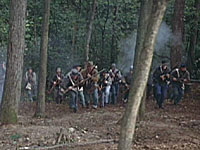 |
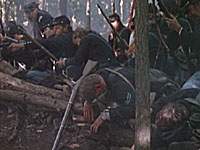 |
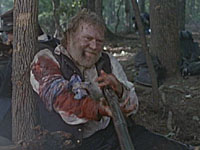 |
|
Col. Chamberlain positions his men, giving them the same inspirational talk he was given about what they need to do there. Then the rebels begin attacking up the hill. Chamberlain has the wall, an incredible advantage, as well as the fact the rebels have to attack up. Charge after charge reduces his men until they're almost out of bullets and will soon be overrun and destroyed.
|
||
 |
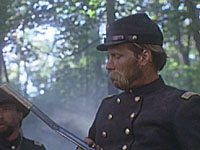 |
 |
|
Col. Chamberlain is shot, but the bullet hits his sword, bending it. It's the first of two painful wounds he'll get at Gettysburg.
|
||
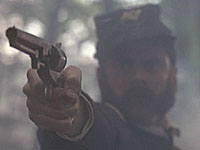 |
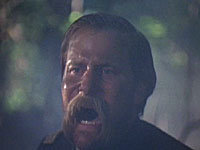 |
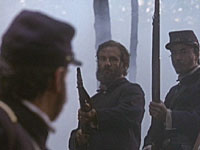 |
|
When a hole forms in his line, he sends his younger brother to fill it, then is horrified that he has put his own brother's life in such danger. Tom runs out of bullets as a man is about to shoot him, and he's saved by Private Bucklin, the deserter whom Chamberlain had talked into joining them.
|
||
 |
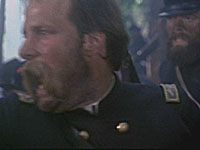 |
 |
|
Finally at the point of absolute helplessness, out of ammunition, Chamberlain (though sometimes it's said that it was Lt. Melcher's idea), forms a military formation and sends his men charging down the hill with fixed bayonets, something the soldiers always hated using. This is where they have no expectation of winning, but desperation makes Chamberlain do it, and it works. His men sweep the Confederates down the hill and capture them. For this, Chamberlain won the Medal of Honor.
|
||
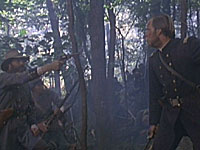 |
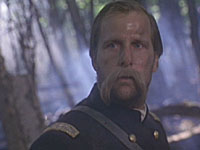 |
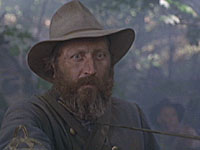 |
|
During the charge Chamberlain, with only his sword, is faced with a Confederate about to shoot him, but the gun misfires, and Chamberlain takes him prisoner.
|
||
 |
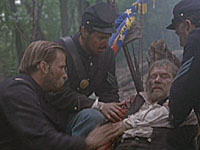 |
 |
|
B: "Colonel. Colonel." The Irish sargaent who has taught the novice Chamberlain all he knows has been hit a second time, and his arm will have to come off.
|
||
 |
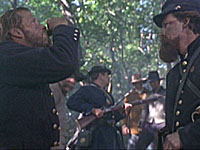 |
 |
|
E: "Colonel, sir. You would so honor me." Ellis shares his flask to congratulate Chamberlain.
|
||
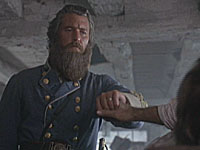 |
 |
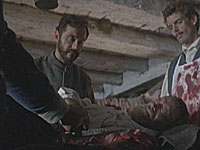 |
|
H: Didn't see much. The boys went in. Hit the rocks. How did it go, Pete? General Longstreet has come to visit his friend General John Bell Hood. They think Hood will make it, but not in one piece.
|
||
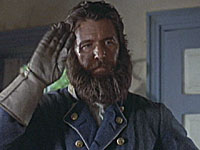 |
 |
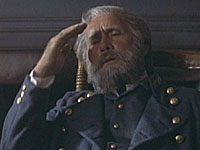 |
|
L: That way around to the right is still open. General Longstreet tries to tell General Lee how to attack the high position - how to get around the Union position, but Lee is very sure the right thing to do is attack straight into the Union guns. Longstreet pushes on every opportunity, but can get nowhere with Lee.
|
||
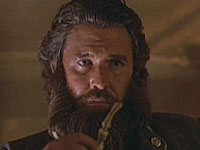 |
 |
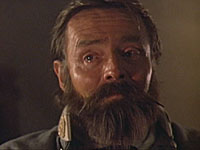 |
|
A: I thought about sitting this one out. But I can't do that. That wouldn't be right either. I guess not. General Armitage comes to talk to General Longstreet because he's learned that the man he loves like a brother, General Hancock, is across the way, and he can't bear the thought that they could shoot at one another. "Things got rough toward the end; I grabbed Win by the shoulders and told him 'Win, may God strike me dead if ever raise my hand against you'. Through three years of war, we've managed to avoid each other on the battlefield. Now, his men are facing us. I thought about sitting this one out; but I can't do that. I would like to see him one last time though." Longstreet, who needs him, agrees that he can't. Armitage thanks him for letting him get it out.
|
||
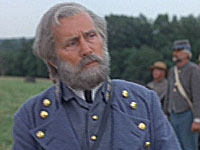 |
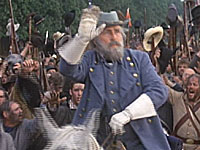 |
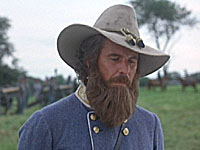 |
|
Lee: What are you thinking, General? General Lee is idolized by his men, and certain that he is right. Longstreet, having failed to convince him, asks to be allowed to turn his units over to someone else to lead. Lee just looks at him until Longstreet folds, ashamed before Lee.
|
||
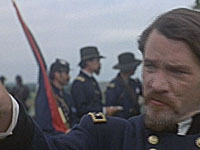 |
 |
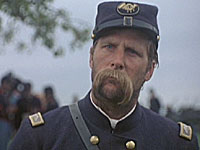 |
|
General Hancock tells Chamberlain of Armitage, on the other side. "Tell me, Professor. In your studies have you come across a story from antiquity of two men who are like brothers facing each other on the field of battle?" "When I look across the field and see the flags of the 9th and 14th Virginia; I can almost see his old crumpled hat and hear his voice. Lewis Armistead was my closest friend before the war. I'd like to see him again; but not here, not like this. What do you say, Colonel; what do the books tell you."
|
||
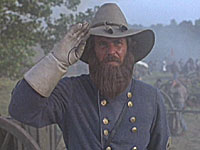 |
 |
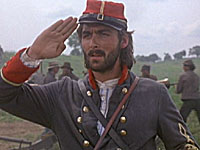 |
|
L: I want you to use everything you have. Maximum effort. Fire all long-range ordinance. But don't open up till I give the word
and everything's in position. Then fire with all you've got. I don't want to see a single gun silent. Find an observation point
and check the damage. We must clear those people off that ridge. If we don't... Anyway, you let me know when you're
nearing the end of your ammunition. We must conserve enough to support the infantry attack. Is that clear? General Longstreet has gone to Alexander to be sure there's enough artillery to support Pickett's men when they make the charge up the long hill. There's not. Alexander explains that the union guns have made them send the ammunition carts far back and it's taking too long to resupply. Longstreet wants to stop his men from making this charge because the bombardment won't be adequate, but knows nothing will stop Lee.
|
||
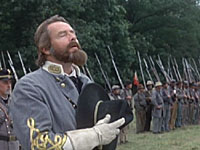 |
 |
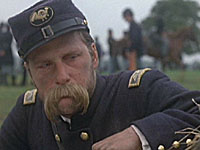 |
|
General Armitage prays before the guns begin firing. Chamberlain learns that Buster has died, and then the artillery begins. It's one of the most constant bombardments, and is meant to soften up the top so that the charge will destroy the Union army.
|
||
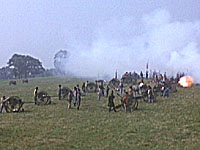 |
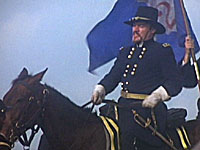 |
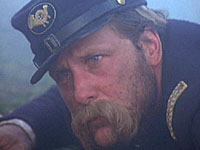 |
|
In the midst of the most terrible bombardment, General Hancock rides within range of the cannons where his men can see him. Chamberlain looks up in amazement. An aide begs Hancock to take cover. Hancock replies, "There are times when a corps commander's life does not count." And this is a lesson Chamberlain will take to heart.
|
||
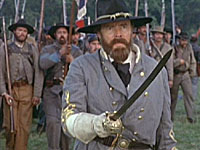 |
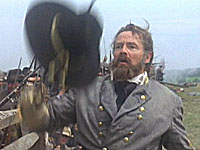 |
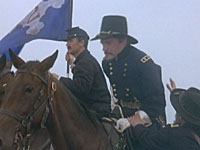 |
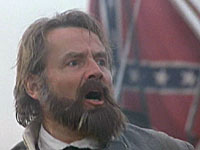 |
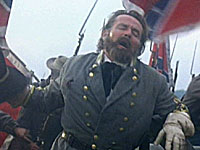 |
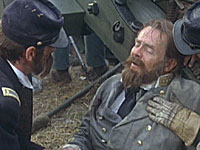 |
|
General Armistead leads his men forward up that long, deadly ground. Hancock is shot, then Armistead is shot. General Armitage is found by Tom Chamberlain, who tries to find out who he is.
"Would like... to see General Hancock. Can you tell me... where General Hancock may be found?"
|
||
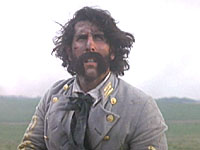 |
 |
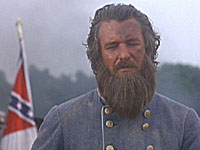 |
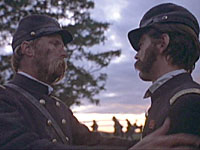 |
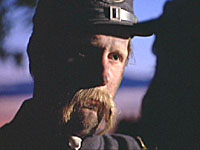 |
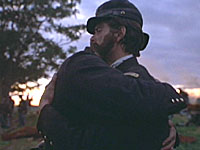 |
|
Aide: General. I'll tell you plain. There are times when you worry me. No good trying to get yourself killed. The Lord will come for you in his own good time. In the aftermath of battle, General Longstreet goes to protect his few men who are coming back down the hill. Worried that he's suicidal, his aide tells him that God will come for him in God's own time. Colonel Chamberlain and his brother find one another on the battlefield.
|
||

|
NJ Governor Lewis Morris |
 Breese Family |
 Lincoln Trial Judge Advocate Henry L. Burnett |
 President George W. Bush |
 Father Bradley Van Deusen |
 Mother Jean Van Deusen |


 Copyright © 2006, Mary S. Van Deusen
Copyright © 2006, Mary S. Van Deusen